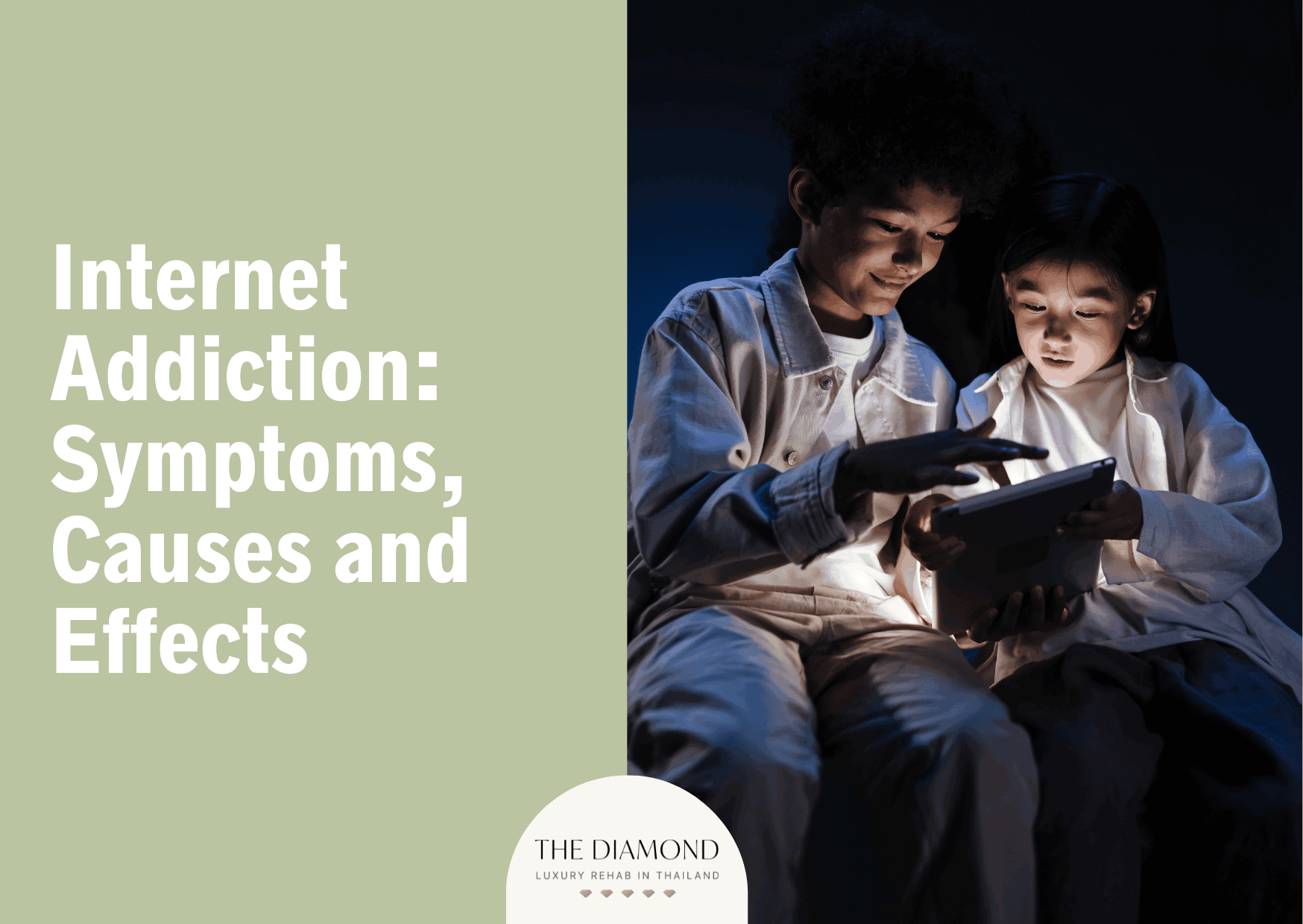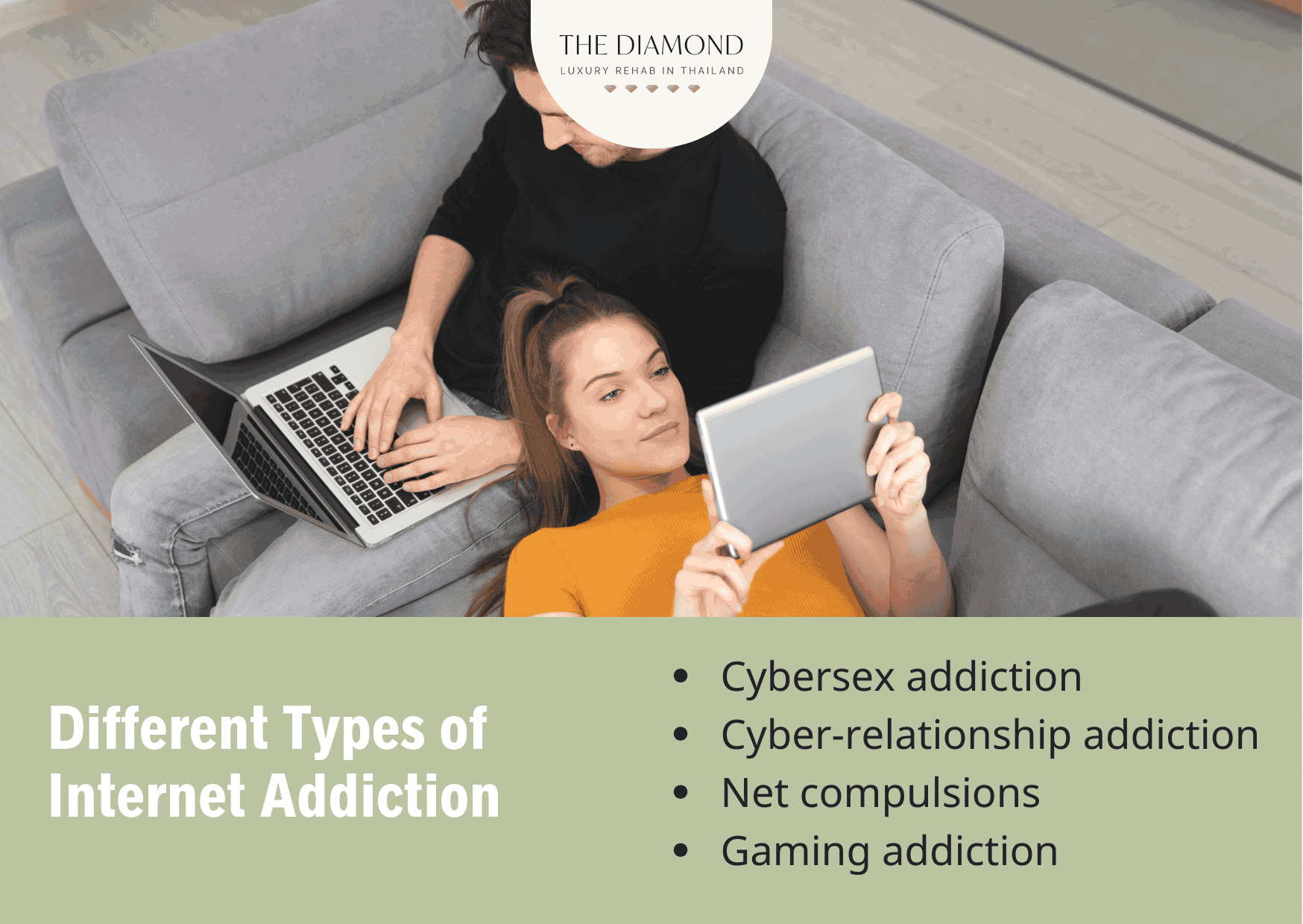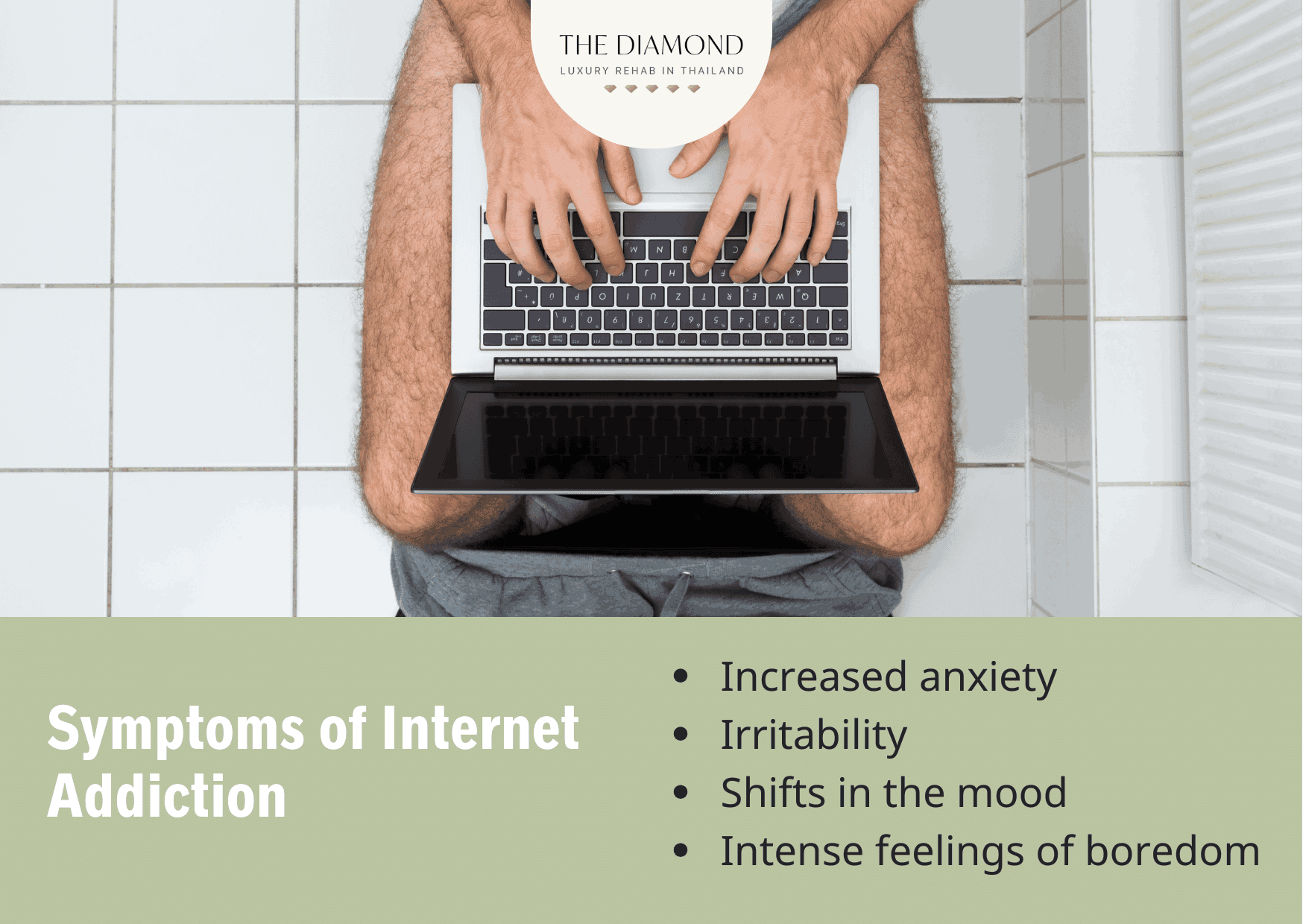Internet addiction: symptoms, causes and effects
Table of content
- What is internet addiction?
- What are the signs and symptoms of internet addiction?
- What are the causes of internet addiction?
- What are the effects of internet addiction?
- What are the treatments for internet addiction?
- How to overcome internet addiction?
- What are the different types of internet addiction?
- What are the symptoms of internet addiction withdrawal?
- What are the symptoms of internet addiction tolerance?
- How does internet and gaming addiction affect the youth?

Internet addiction is a range of behaviors that refers to the excessive use of the internet which ends up affecting many aspects of a person’s life. Excessive computer use becomes problematic when it interferes with one’s relationships, work, or school.
Signs that are indicative of internet addiction can be physical or emotional. The most common symptoms of internet addiction include unintended weight gain or loss, poor personal hygiene, backache, headaches, increased irritability, anxiety, and depression. Both physical and emotional symptoms of internet addiction are a result of remaining inactive for long periods and becoming dependent on the use of the internet.
The causes of internet addiction are genetics, structural brain changes, environmental factors, and underlying mental health conditions which all play a role in the development of the condition. There is increasing evidence of biological and genetic predispositions to addictive behaviors around computers.
The effects of internet addiction can manifest in both physical and emotional ways, including bad posture, carpal tunnel syndrome, vision problems, damaged personal relationships, and mental health concerns such as anxiety and depression. The lack of interpersonal interactions can take a huge toll on an internet addict’s offline personal relationships.
What is internet addiction?
Internet addiction is the excessive use of the internet to the point where many responsibilities in life are neglected, as defined by Martha Shaw and Donald Black of the Roy J. and Lucille A. Carver College of Medicine of the University of Iowa. The condition encourages unhealthy behaviors similarly seen in other types of addiction, including the persistent need to achieve the same high and the neglect of relationships, finances, or jobs. The addicted person spends a significant amount of time on the internet and becomes increasingly dependent on the internet or other online devices.
The addicted person spends a significant amount of time on the internet and becomes increasingly dependent on the use of the internet or other online devices.
What are the signs and symptoms of internet addiction?
The signs and symptoms of internet addiction can be physical or emotional. The most common signs and symptoms of internet addiction are listed below.
Physical symptoms of internet addiction include:
- Back or shoulder pain
- Headaches
- Vision problems
- Insomnia
- Lack of proper hygiene
- Poor nutrition
- Unintended weight gain or loss
Emotional symptoms of internet addiction include:
- Anxiety
- Depression
- Increased irritability
- Isolation
- Feelings of guilt
- Avoidance of work
- Feelings of euphoria when using the computer
What are the causes of internet addiction?
Excessive internet use has multiple contributing factors. The causes of internet addiction are listed below.
- Genetics: Addictive behaviors can be associated with genetic predisposition, according to a 2006 study entitled “the neurobiology of substance and behavioral addictions” published in CNS Spectrums. Some people are predisposed to internet addiction because of dopamine and serotonin deficiency. Internet addicts have lower levels of dopamine and serotonin compared to the general population and this could explain the engagement in risky addictive behaviors to achieve a pleasurable response, as reported by Cash et al., in an article review published in Current Psychiatry Reviews in 2012.
- Structural brain changes: Compulsive internet use can physically change the structure of the brain. Internet addiction affects the gray and white matter in areas of the prefrontal regions of the brain which are associated with remembering details, planning, attention span, and prioritizing tasks. A theoretical model and review of neuropsychological and neuroimaging findings published at Frontiers in Human Neuroscience in 2014 suggest that internet addiction reduces an individual’s prefrontal control processes and may be related to loss of control over internet use.
- Environmental factors: Social environmental factors that contribute to the development of internet addiction include exposure to internet game advertisements and accessibility to PC cafés, according to a 2019 article by Sulki Chung, Jaekyoung Lee, and Hae Kook Lee published in the International Journal of Environmental Research and Public Health. Moreover, early exposure to substance use increases the risk of addiction later in life. Similarly, early access to the internet poses a concern that may lead to amplified risks of internet addiction.
- Underlying mental health conditions: People who suffer from anxiety or depression are more likely to turn to the internet to find relief from symptoms. Similarly, shy people or those who suffer from social awkwardness are at an increased risk of having an addiction to the internet. As reported by Richard Davis from the Psychology Department of York University in his article published in Computers in the Human Behavior journal, dependence on the communicative features of the internet is commonly linked to a lack of real-life social support and feelings of social isolation or loneliness which all contribute to the development of internet addiction.
What are the effects of internet addiction?

The effects of internet addiction on people of various ages are listed below.
- Effects on kids: Internet addiction negatively impacts a child’s physical and mental health, which includes difficulty sleeping, altered attention span, increased risk of becoming obese, increased irritability, and higher chances of developing anxiety and depression. In a research paper by Zhou et al., published in the Journal of Affective Disorders in 2022, it is reported that a heightened level of fatigue is associated with increased internet screen time before bed, thereby reducing sleep time.
- Effects on adults: Individuals with months of excessive internet use exhibit depression and anxiety, according to a 2018 study on internet addiction and its relation to psychopathology and self-esteem among college students of Kolkata, India published in the Industrial Psychiatry Journal of the National Library of Medicine. Additionally, internet addiction is also affiliated with obsessive-compulsive symptoms and interpersonal sensitivity that affects social life and relationships. People who remain online for long periods of time may also start using one or more substances to remain awake and lengthen internet use.
- Effects on working professionals: Internet addiction negatively affects a person’s performance and productivity at work, as reported in a 2018 study titled internet addiction at workplace and its implication for workers life style in Southern India published in the Asian Journal of Psychiatry. Furthermore, internet addiction is a risk factor with implications for occupational satisfaction and mental health.
What are the treatments for internet addiction?
The procedures for treating internet addiction are listed below.
- Medication: The use of medications is beneficial for people who are suffering from underlying mental health conditions such as depression or anxiety and have developed internet addiction as a result. Antianxiety and antidepressant medications can be used to deal with the symptoms of depression or anxiety. Pharmacological treatment through medications has shown promising results such as decreased non-essential and essential internet use and improved control over internet use, according to a 2016 systematic review of clinical research on internet addiction and problematic internet use published in the World Journal of Psychiatry.
- Cognitive behavioral therapy (CBT): A common approach in treating internet addiction is CBT. It focuses on changing negative thought patterns that trigger anxiety and produce addictive behaviors. In a clinical study led by Veruska Andrea Santos published in the Journal of Medicine Internet Research in 2016, patients who received medications through pharmacotherapy and modified cognitive behavioral therapy have shown significant improvement throughout the course of the treatment. Patients gained the confidence to eagerly regulate their internet use.
- Support groups: People who suffer from electronic addiction can find solace in support groups that provide a safe place while reducing shame or social isolation. Internet addiction support groups include Internet and Technology Addicts Anonymous, Online Gamers Anonymous, Computer Gaming Addicts Anonymous, and reSTART. According to a 2015 study on multi-family group therapy for adolescent internet addiction published in Addictive Behaviors, multi-family group therapy showed promising effects in reducing internet addiction tendencies among adolescents.
- Inpatient treatment program: Residential or inpatient treatment programs involve staying in a professionally staffed facility. In a supportive environment that offers medical supervision, an internet addict can recover without worrying about internet usage.
How to overcome internet addiction?
An effective way of overcoming internet addiction is by engaging in self-corrective behaviors and creating a system of selective prevention. In addition to the treatment options for internet addiction including medication, cognitive behavioral therapy, support groups, and inpatient treatment program, practicing self-control is also beneficial for internet addicts. Recognizing certain personal vulnerabilities and the tendencies that cause them helps formulate a specialized approach to address the increasing risk of internet addiction, as suggested by Lee et al., in their 2019 article published in Current Addiction Reports. Moreover, access limitation is a direct prevention strategy and is potentially highly effective.
In limiting internet access, a person can block distracting websites for a certain amount of time. Since the internet is used for many purposes in everyday life, one can selectively decide which sites can be visited or prohibited for a set amount of time. It will be helpful to make a list of sites that keep you from focusing on other more important tasks like doing school- or work-related assignments while on the internet.
Cutting down on internet use can also have a profound effect on the amount of time spent in front of the computer. A person can make a personal list of activities once enjoyed but cannot take on anymore because of internet addiction. This can provide increased motivation for controlling internet usage. An effective activity to cut down internet use is exercise-based intervention. According to an article published in 2020 by Frontiers in Psychology about Neurobiological and Neuropsychological Evidence for Exercise-Based Interventions for Internet Addiction, exercise-based intervention has shown reduced pervasiveness and symptoms of internet addiction. Exercise displaces internet experience and at the same time improves physical and mental health.
What are the different types of internet addiction?

The internet can be used in several ways that can be equally addictive. In a series of published studies, Dr. Kimberly S. Young, a licensed psychologist and an internationally known expert on internet addiction, categorized the different types of internet addiction listed below.
- Cybersex addiction: using online pornography, adult chat rooms, and webcam services. An individual who suffers from cybersex addiction often struggles to form real-world, intimate relationships due to the unrealistic sexual fantasies seen in porn.
- Cyber-relationship addiction: turning to chat rooms or social networking sites to create relationships online. Cyber relationship addicts are obsessed with finding relationships on online platforms. As a result, addicted individuals may lose touch with the real world, leading to the destruction of offline personal relationships.
- Net compulsions: engaging in online interactive activities, including gambling, trading stocks, auctions, and online shopping. Excessive time spent in such activities may lead to overspending, ruining one’s financial stability, and causing problems at work.
- Gaming addiction: when playing a game, one can easily lose track of time. Unfortunately, for gaming addicts, this could mean avoidance of school or work to allot more time for playing games. As internet use became more prevalent, the answer to why is internet addictive became clearer.
- Compulsive information seeking: the uncontrollable urge to look up data online. A certain degree of curiosity is normal. However, some people cannot resist the urge to gather information on the web to the point of developing severe anxiety issues.
What are the characteristics of internet use disorder?
The most common characteristics of internet use disorder as described by Professor Hing Keung Ma of the Department of Education Studies at the Faculty of Social Sciences, Hong Kong Baptist University, in an article published in The Scientific World Journal in 2011, are listed below.
- Excessive use of the internet: How much screen time is too much may be subjective. However, internet use usually becomes the center of an internet addict’s daily life. Someone addicted to internet use often remains online longer than intended.
- Preoccupation with thoughts about the internet: A person with internet addiction disorder has obsessive thoughts about the internet. An individual may constantly recall previous online activity or look forward to the next internet session. Someone with internet addiction may find it hard to stop thinking about the internet for the entirety of the day.
- The need for a quick fix: Quick fix refers to a solution that is preferred not because of its effectiveness, but because it offers the quickest remedy. A person may use the internet as an escape to fix a bad mood.
- Tolerance: a common symptom similarly seen in alcohol and drug addiction. Developing tolerance means wanting increased amounts of time on the computer to achieve satisfaction. This ultimately results in the neglect of other responsibilities in life due to internet use taking a large chunk of one’s time.
- Withdrawal: The withdrawal symptoms of an internet addict include increased irritability, anger, or restlessness when trying to cut down on internet usage or when internet access is not available.
- Impact on quality of life: Internet addiction has negative repercussions on one’s quality of life. From personal relationships to career and education, one may neglect responsibilities in such areas of life because of the internet.
What is the relationship between internet addiction and mental illness?
There is a strong correlation between internet addiction and a variety of psychological disorders, including anxiety, depression, low self-esteem, and bipolar disorder. According to a systematic review of clinical research on internet addiction and problematic internet use from the World Journal of Psychiatry, studies indicate that mental comorbidities appear to be common for people who suffer from internet addiction, particularly mood and anxiety disorders. There is a strong link between mood disorders and internet addiction. Spending a significant amount of time online may lead to reduced time spent available for other alternative leisure activities and social interactions resulting in increased loneliness and stress. Extreme online activity can serve as a coping mechanism to escape from real-life problems, however, it can also exacerbate stress and negative feelings potentially leading to addictive behaviors and depressive symptoms.
Furthermore, individuals suffering from internet addiction exhibit comorbid anxiety disorders such as social anxiety and social phobia. Considering that the virtual space limits potential anxiety-provoking aspects of in-person interaction, people who struggle with physical interactions may turn to the internet for social connections.
Internet addiction is detrimental to one’s mental health that manifests in physical health issues. Psychiatric disorders and internet addiction coexist. Prolonged and intensive internet use can lead to a heightened state of psychological stimulation, causing disruptions to sleeping patterns, eating habits, and physical activities. This, in turn, can have adverse effects on an individual’s physical and mental well-being, including an increased risk of depression, obsessive-compulsive disorder, strained family relationships, and anxiety according to a study published in the Journal of Research in Medical Sciences of the Isfahan University of Medical Sciences.
Who is the most vulnerable to internet addiction?
Male adolescents are the most vulnerable to internet addiction. In a chaper she authored in the book Child and Adolescent Mental Health published in 2017, Prof. Pabasari Ginige stresses that “adolescence is a risk factor” in internet addiction. Meanwhile, a 2017 study on Internet Addiction Through the Phase of Adolescence from the Journal of Medical Internet Research found that adolescents in the age group of 15-16 years, particularly males, are highly susceptible to developing Internet addiction.
Adolescence is a critical stage in human development encompassing a range of biological, psychological, and social changes. Coping with these changes can be challenging for both adolescents and their families. Furthermore, the Internet has transformed the dynamics of human interaction, conceivably amplifying the lack of ability to maintain social connections as stated by Dr. Bryan Pridgen in his article published in the Harvard Review of Psychiatry in 2010.
How do you deal with Internet addiction?
Dealing with internet addiction starts with moving out of the denial stage and admitting that the problem exists. Admitting the existence of the problem makes a person more open to the possibility of seeking treatment.
As suggested by a 2016 systematic review of clinical research on internet addiction and problematic internet use published in the World Journal of Psychiatry, treatment options for internet addiction include self-help techniques (like cutting out problematic apps and sites), effective time management, tracking time spent online, as well as seeking professional and medical assistance.
What are the symptoms of internet addiction withdrawal?

Internet addiction can cause drug-like withdrawal symptoms. As explained in A Case of Withdrawal Psychosis from Internet Addiction Disorder published under Psychiatry Investigation of the Korean Neuropsychiatric Association in 2014, the most common symptoms of internet addiction withdrawal, are listed below.
- Increased anxiety: An individual who suffers from an addiction to the internet can have increased anxiety levels when access to the internet is blocked. Anxiety can also be experienced if the person is unable to spend as much time on the internet as desired.
- Irritability: The inability to access the internet and stay away from it can cause increased irritability.
- Shifts in the mood: A person may start excessively using the internet in an attempt to improve one’s mood. Contrastingly, shifts in mood can be observed when a person is trying to cut down on internet use.
- Intense feelings of boredom: When one is taken away from the fast responses, immediate rewards, and different activities that the internet can offer, intense feelings of boredom may be experienced.
- Increased urge to use the internet: Crave-related brain areas tend to activate in people trying to withdraw from intensive internet use. This is especially true in cases where gaming is involved.
- Psychosis: In certain cases, psychotic symptoms during internet addiction withdrawal have been reported. Withdrawal psychosis may involve agitation, aggressiveness, delusion, and disorganized behaviors.
What are the symptoms of internet addiction tolerance?
The most common symptoms of internet addiction tolerance, as described by King et al., in a 2016 article published in the Journal of Behavioral Addictions, are listed below.
- The need for increasing time spent online: A person who is addicted to the internet may need increasing amounts of time spent on the computer to achieve the desired effect.
- The need for better rewards: According to the Variable Ratio Reinforcement Schedule (VRRS) theory, internet addiction can result from multiple layers of rewards. For instance, receiving likes and comments on a photo is a form of reward that can make a person come back for more and look forward to better rewards.
- A changed perception of goals: A person may have a changing perception of goals and standards while suffering from internet addiction. This is characterized by a diminished sense of satisfaction with the rewards provided by the internet that one is already familiar with.
- Time loss while surfing the web: People who are immersed in the online world easily lose track of time. A related symptom is disconnection from reality or being clueless about what is happening in the surroundings.
How does internet and gaming addiction affect the youth?
Internet and gaming addiction affects the youth by causing social isolation that keeps a person from living a normal life. The long hours spent gaming may mean missing out on family events, outings with friends, or skipping school.
As a result, someone with digital addiction may suffer from a lack of social skills, poor mental health, and emotional difficulties. The social consequences of internet and gaming addiction can also lead to anxiety and depression as the condition hinders one’s ability to form and maintain healthy relationships as reported by Daniel King, Madeleine Herd, and Paul Delfabbro from the School of Psychology of The University of Adelaide in their study published in the Journal of Behavioral Addictions.
This lack of skill to establish relationships will, unfortunately, feed the addiction, making the gaming addict return to the online world where relationships are formed without having to work for them.
